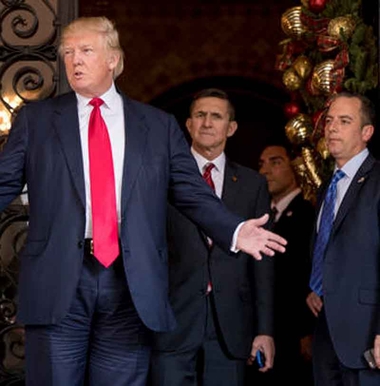Trump keeps trafficking in ambiguity on policy proposals

Washington (AP) — President-elect Donald Trump's call with Taiwan's leader was either a well-coordinated warning shot to China or a harmless congratulatory conversation. His provocative campaign proposal for temporarily halting Muslim immigration to the United States may or may not be back on the table.
And his stance on nuclear weapons? Trump said Thursday that he wants to "greatly strengthen and expand" U.S. nuclear capabilities, without offering any detail about what that would entail.
As Trump shapes his policy agenda ahead of next month's inauguration, he is trafficking in the same ambiguity that was a hallmark of his presidential campaign. The strategy proved useful to Trump as a candidate, keeping his rivals off balance and allowing voters of varying ideological persuasions to draw their own conclusions from his remarks.
"President-elect Trump has so far taken so many stands on so many issues so ambiguously that he's hard to hold to account," said Anthony Cordesman, a scholar at the Center for Strategic and International Studies. "And that's not a criticism."
As president, ambiguity is a high-risk doctrine, particularly on foreign policy matters. For every adversary Trump may try to keep on edge, he could engender confusion and anxiety from allies that rely on clarity and stability from the United States. Mixed messages from Washington could also provoke an unintended response from abroad with wide-ranging economic or security implications.
"It's one thing to be ambiguous to set our adversaries or those we have to leverage or negotiate with on their heels," said Benjamin Chang, who worked as a foreign service officer in the Obama, George W. Bush and Clinton administrations. "But what does it do to our allies that rely on us?"
Trump promised throughout the campaign that he would be a more "unpredictable" commander in chief, accusing President Barack Obama of forecasting his strategy to American enemies.
"We are totally predictable," Trump said during a foreign policy address in April. "We tell everything. We're sending troops? We tell them. We're sending something else? We have a news conference. We have to be unpredictable, and we have to be unpredictable starting now."
Whether Trump's hazy and contradictory statements are part of a calculated strategy or signal his inexperience on international issues will be one of the central questions hanging over the first months of his presidency. The questions will only grow if he continues to deliver many of his pronouncements on Twitter and does not flesh out details in news conferences or policy briefings.
Trump has not held a news conference since winning the election more than a month ago.
It was Trump's call with Taiwan's president that seemed to leave little doubt he planned to keep up his freewheeling campaign style as he tackles major issues in the White House. The call thrust Trump into the center of one of Asia's most delicate diplomatic issues and prompted speculation that he might sever Washington's long-standing "One China" policy, which acknowledges Beijing considers Taiwan its territory.
Weeks later, Trump's goal in taking the call remains unclear. He's both suggested he was simply accepting a congratulatory call and said he doesn't understand why the U.S. should be bound by the "One China" policy, "unless we make a deal with China having to do with other things, including trade."
On Thursday, Trump chimed in on another hot-button issue without providing context or clarity: the nation's nuclear stockpiles. He abruptly tweeted that the U.S. should "greatly strengthen and expand its nuclear capability," but did not say what his proposals would entail or why he raised the matter on a quiet morning a few days before Christmas.
A subsequent statement from Trump's spokesman also did not address what the president-elect meant by calling for an expansion of U.S. nuclear capabilities.
The issue that has generated perhaps the most confusion among Trump supporters and opponents alike is his stance on banning Muslim immigration to the U.S. as a means to combat terrorism. Trump called for a temporary ban during the GOP primary, but later shifted his rhetoric to focus on halting immigration from an unspecified list of countries with terrorism links.
Following this week's deadly truck attack in Berlin, Trump was asked whether he was reevaluating the Muslim ban.
"You know my plans," Trump said, without listing his plans. "All along, I've been proven to be right, 100 percent correct."
Cordesman said clarity on Trump's objectives will likely only come once he's in the position to make concrete decisions as commander in chief.
"Everybody is either criticizing him for being very naive and careless or looking for the secret plan," Cordesman said. "The only way to find out is to see what happens after he's in office."
By Julie Pace, AP White House Correspondent. Copyright 2016 The Associated Press. All rights reserved. This material may not be published, broadcast, rewritten or redistributed.
The Gayly – December 23, 2016 @ 7:10 a.m.





